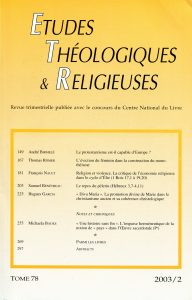Le motif du pélerinage du peuple de Dieu, indéniablement présent dans l’épître aux Hébreux, s’accompagne de la promesse d’un « repos ». Pour des commentateurs importants, ce repos ne peut être situé qu’au terme du parcours, après la mort du croyant : c’est l’objet d’une espérance, une réalité purement eschatologique. À partir d’indices fournis par la section étudiée et en fonction de la théologie de l’épître, Samuel Bénétreau propose une interprétation plus souple qui laisse place à une actualisation du repos durant la vie terrestre, avant une jouissance plénière. Deux questions majeures sont en jeu. D’une part, le poids des données immédiates du texte par rapport à celui de notions considérées comme déjà établies et disponibles dans le contexte religieux, et, d’autre part, la prise en compte des tensions propres au monde conceptuel de l’épître.
Nous entrons , en effet, dans le repos, nous qui avons cru (He 4,3)
Empressons-nous donc d’entrer dans ce repos (He 4,11)
The Epistle to the Hebrews deals extensively with the theme of the desobedience of Israel in the section 3,7-11, applying the words of Psalm 95,7-11 to the situation of the intended readers, calling them to strive without delay to « enter that rest ». What kind of rest is in view, a rest to be compared with the Creator’s rest, a rest from one’s works ? Several well known commentators are convinced that this is necessarily an exclusively eschatological rest, a matter of hope to be enjoyed by the faithful christian at the Parousia or after his death. This interpretation is largely grounded on the conviction of a fixed eschatological meaning for the idea of a rest in God at the disposal of the author of the Epistle. The following study endeavours to prove that a more extended meaning, including also a partial enjoyment in this world, is to be taken into account. The religious text of this period give evidence of a large diversity in the ways the expression is used. The logic of the demonstration undertaken by the author leads to the conclusion that a decisive step to enter the rest immediately is called for. And the idea of a « rest from one’s works » does not necessarily calls to mind the ultimate bliss. One must not forget that, besides a « futuristic » eschatology, there is in the Epistle to the Hebrews a heaven/earth dualism which gives a room for a precious relationship with the invisible realities.
p. 203-223
Auteur
BENETREAU Samuel
Samuel BENETREAU, pasteur de l'Union des Églises évangéliques libres de France, est professeur émérite de Nouveau Testament à la Faculté de théologie évangélique de Vaux-sur-Seine.
